Summary of the 2022-2025 CIHR-ICRH Strategic Plan: Partnerships for Better Health

Summary of the 2022-2025 CIHR-ICRH Strategic Plan
The CIHR Institute of Circulatory and Respiratory Health supports research on some of the most important health challenges in Canada
The heart, brain (stroke), blood and blood vessel, lung and sleep conditions within the Institute mandate account for the highest number of deaths, hospitalizations, need for critical care, emergency department visits and comorbid conditions in Canada.
The Institute is one of 13 virtual Institutes located across the Canada that collectively make up the Canadian Institutes of Health Research (CIHR), Canada’s premier health research funding agency.
Top Five Reasons for Hospital Stays in Canada
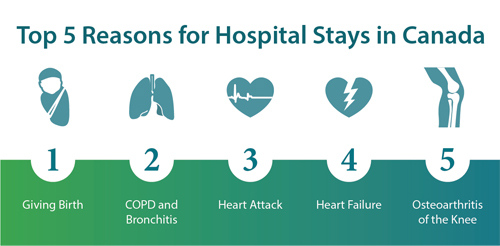
Long description
Reason 1 – Giving Birth
Reason 2 – COPD and Bronchitis
Reason 3 – Heart Attack
Reason 4 – Heart Failure
Reason 5 – Osteoarthritis of the Knee
CIHI. (2021, 04 29). Hospital stays in Canada. Retrieved from Canadian Institute for Health Information.
Top Five Reasons for Primary Care Visits in Developed Countries
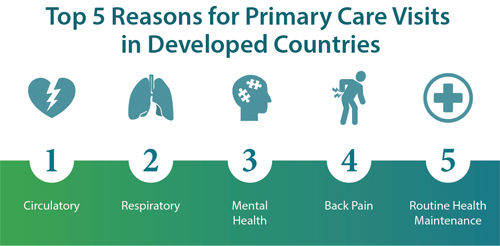
Long description
Reason 1 – Circulatory
Reason 2 – Respiratory
Reason 3 – Mental Health
Reason 4 – Back Pain
Reason 5 – Routine Health Maintenance
Finley, C. R., Chan, D. S., Garrison, S., Korownyk, C., Kolber, M. R., Campbell, S., Eurich, D., Lindbald, A. J., Vandermeer, B., Allan, G. M. (2018). What are the most common conditions in primary care? Canadian Family Physician, 832-840.
The CIHR-ICRH Strategic Plan 2022–2025 will guide the Institute through a period of recovery and growth following the pandemic and represents the culmination of many months of dialogue with our research community
By listening and working with our stakeholders, we aim to achieve Partnerships for Better Health.
The Plan represents the culmination of many months of dialogue and listening with our community. The plan includes a central tenet of partnerships and focuses on three strategic priorities: Preparing Future Capacity, Accelerating Knowledge Through Collaboration and Catalyzing Impact Through Knowledge Mobilization. In addition, Strengthening Indigenous Health Research and Enhancing Equity, Diversity and Inclusion in Health Research reflect two foundational themes that the Institute has focused on over the past six years and will continue to champion in the future.
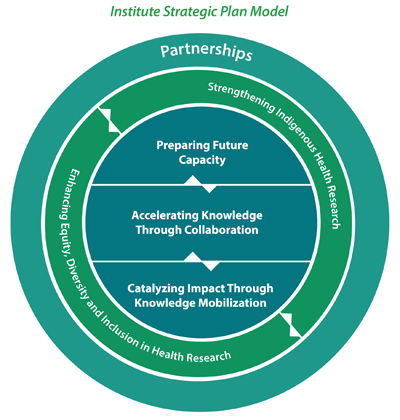
Long description
A Central Tenet:
- Partnerships: To enhance existing and build new partnerships with other Institutes, with CIHR, and with external partners, including people with lived and/or living experience.
Two Foundational Themes:
- Strengthening Indigenous Health Research (IHR): To continue to champion the conduct of research led by Indigenous Peoples and people with demonstrated culturally safe engagement with Indigenous communities; and,
- Enhancing Equity, Diversity, and Inclusion (EDI) in Health Research: To support ICRH mandate area activities that are conducted on and/or by those who represent the diversity and intersectionality of ICRH community members and stakeholders.
Three Strategic Priorities:
- Preparing Future Capacity: To attract, retain and develop future research and knowledge leaders within the Institute mandate areas;
- Accelerating Knowledge Through Collaboration: To create and support innovative purpose-driven research collaborations to generate knowledge within the Institute mandate areas; and,
- Catalyzing Impact Through Knowledge Mobilization (KM): To maximize the application and impact of new and existing knowledge created by and for the ICRH research community.
Central Tenet
Partnerships: To enhance existing and build new partnerships with other Institutes, with CIHR and with external partners, including people with lived and/or living experience.
Strategic Priorities
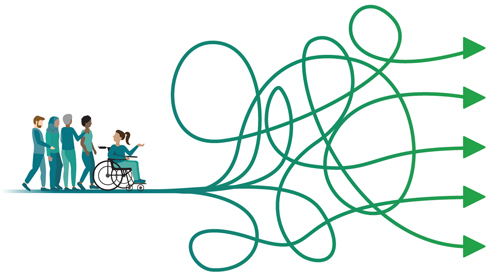
Preparing Future Capacity: To attract, retain and develop future research and knowledge leaders within the Institute mandate.

Accelerating Knowledge Through Collaboration: To create and support innovative purpose-driven research collaborations to generate knowledge within the Institute mandate areas.

Catalyzing Impact Through Knowledge Mobilization: To maximize the impact of new and existing knowledge created by and for the ICRH research community.
Foundational Themes

Strengthening Indigenous Health Research: To champion research led by Indigenous Peoples (First Nations, Inuit and Métis) and people with demonstrated culturally safe engagement with Indigenous communities.
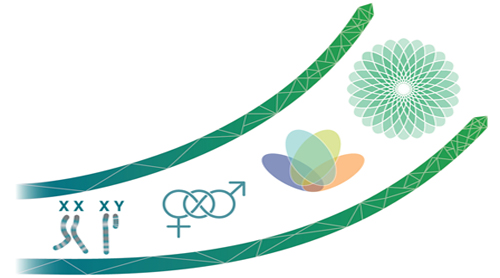
Enhancing Equity, Diversity and Inclusion in Health Research: To support ICRH mandate area activities that are conducted on and/or by those who represent the diversity and intersectionality of ICRH community members and stakeholders.
Land Acknowledgment
We respectfully acknowledge that the land on which we developed The Plan is Treaty 6 Territory in Western Canada, the traditional meeting ground and home for many First Nation Peoples (Cree, Saulteaux, Niisitapi [Blackfoot], and Nakota Sioux) and Métis. We acknowledge their diverse histories and cultures, and we pay respect to all Indigenous Peoples (First Nation, Inuit, and Métis) from coast to coast to coast, for their past and ongoing contributions to society. We strive for respectful partnerships with Indigenous Peoples as we search for healing and true reconciliation.
Contact
Canadian Institutes of Health Research
Institute of Circulatory and Respiratory Health
8215-112 Street, Suite 602
Edmonton, Alberta T6G 2C8
- Date modified: